- Home
- Rick Yancey
The Curse of the Wendigo Page 4
The Curse of the Wendigo Read online
Page 4
Page 4
“I understand that you’re bitter—”
“To assume I am bitter proves your lack of understanding. It assumes I harbor some residuum of affection, which I assure you I do not. ”
“Can you not put aside who asks for help and consider the one who needs it? You loved him once. ”
“Whom I have loved is none of your business. ”
“True. My business is with whom I love. ”
“Then why don’t you find him yourself? Why have you come all this way to bother me with it?”
Straining forward in my eagerness to eavesdrop, I lost my balance and nearly dropped the tray, stumbling into the doorway like a drunkard, while the tea sloshed from the spout and the cups rattled in their saucers. I discovered the doctor standing by the fireplace. Muriel sat stiffly in the chair a few feet from him, a piece of stationery clutched in her hand.
The doctor clucked his disapproval at me, then stepped forward and snatched the letter from her hand. I placed the tray on the table beside her.
“Your tea, Mrs. Chanler,” I said.
“Thank you, Will,” she said.
“Yes, leave us,” the doctor said, his nose stuck in the letter.
“Is there anything else I can get for you, ma’am?” I asked. “We have some fresh scones—”
“Do not,” growled the doctor from behind the paper, “bring out the scones!”
He snorted and tossed the letter upon the floor. I snatched up the letter and, forgotten for a moment in the heat of their tête-à-tête, read it through.
Dear Missus John,
You forgive my English, its not goodly done. Got back to RP this morning came straightaway to post this. There is no good way to say this, I am sorry. Mister John—he gone. It called to him and the thing done carried him off. I tell Jack Fiddler and he will keep the lookout for him but its got him and even ol Jack Fiddler cant get him back now. I told him not to go, but it called him night and day, so’s he went. Mister John he rides the high wind now and the Mossmouth not going to let him go. I’m sorry, missus.
P. Larose
“Will Henry,” the doctor snapped. “What are you doing? Give me that!” He snatched the letter from my hand. “Who is Larose?” he asked Mrs. Chanler.
“Pierre Larose—John’s guide. ”
“And this Jack Fiddler he mentions?”
She shook her head. “I’ve never heard the name before. ”
“‘He rides the high wind now,’” the doctor read, “‘and the Mossmouth not going to let him go. ’ I suppose not!” He laughed humorlessly. “I assume you’ve notified the proper authorities. ”
“Yes, of course. The search party returned to Rat Portage two days ago. . . . ” She shook her head, unable to go on.
“Then I fail to see how I can help,” said Warthrop. “Except to state my opinion that this is no matter for monstrumology. Whatever bore your husband away on the ‘high wind’ was no ‘Mossmouth,’ though I find the imagery oddly compelling. I’d never heard the sobriquet applied to a Lepto lurconis. It must be an invention of the good Monsieur Larose and not, I suspect, the only one. It would not be the first time a death in the wilderness has been attributed to the Wendigo. ”
“You think he’s lying?”
“I think he is being false—intentionally or not, I cannot say. Lepto lurconis is a myth, Muriel, no more real than the tooth fairy—which is the strangest aspect of this whole affair. Why was John searching for something that does not exist?”
“He was . . . encouraged to go. ”
“Ah. ” The monstrumologist was nodding. “It was von Helrung, wasn’t it? Von Helrung told him to go—”
“He suggested it. ”
“And being the good little lapdog that he is, John went. ”
She stiffened. “I am wasting my time, aren’t I?” she asked.
“That is the issue, Muriel. How long has he been missing?”
“Almost three months. ”
“Then, yes, you are wasting your time here. There is nothing I can do for you—or for John. Your husband is dead. ”
Though tears shone in her eyes, she did not break. Though every fiber of her being bespoke her desperation, she held firm in the face of his bald assertion. Men might be the stronger sex, but women are made of much sterner stuff!
“I refuse to believe that. ”
“Your faith is misplaced. ”
“No, Pellinore, not my faith. My hope that the one man I thought I could turn to . . . whom John could turn to—”
Warthrop nodded. He turned his gaze from her lovely upturned face and spoke in that dry, lecturing manner I had often heard. “Once, in the Andes, at base camp on the slopes of Mount Chimborazo, I came face-to-face with a mature male Astomi, a creature with the disconcerting ability to scream at decibel levels loud enough to shatter the eardrum; I have seen men’s brains literally leaking from their ears after an encounter with one. He had stumbled upon our camp in the dead of night and was as surprised as I at our meeting. For a moment we just stared at each other, our faces no more than a foot apart. I had my revolver; he had his mouth; and at any time we both had the opportunity to use them. We held this way for several tense minutes, until finally I said to him, ‘Well, my friend, I will agree to hold my fire if you will agree to hold your tongue!’”
The lesson of this impromptu parable was not lost on her. She nodded slowly, set down her cup, and rose from the chair. Though she made no move toward either of us, the monstrumologist and I drew back. There is beauty that soothes like the warm kiss of the spring sun upon the cheek, and then there is beauty that terrifies, like the cry of Ozymandias, inviting despair.
“I am a fool,” she said. “You will never change. ”
“If that was your hope, then, yes, you are quite foolish. ”
“I am not the only one. I pity you, Pellinore Warthrop. Do you know that? I pity you. The most intelligent man I have ever met, and also the most vain and vindictive. You have always been a little in love with death. That’s the surprising thing. I should think you’d leap at the chance to see it again face-to-face. It’s the only reason you chose your repulsive ‘profession. ’”
She whirled away and hurried from the room, a hand pressed against her mouth as if to stop up what else might come out.
I glanced at the doctor, but he had turned away; his face was half in shadow, half in light. I hurried after Muriel Chanler and helped her with her wrap. A gust of wind blew through the door when I opened it, and rain spattered and popped upon the vestibule floor. At the curb, through the gray curtain of the storm, I could see the shining black hansom, the driver hunched in his seat, the withers of the great dray horse glittering with the watery sheen.
“It was a pleasure to meet you, Will,” she said before she stepped out. A hand rested briefly upon my shoulder. “I will pray for you. ”
In the parlor the doctor had not moved, nor did he upon my return. I stood for several awful moments in silence, not knowing what to say.
“Yes?” he said softly.
“Mrs. Chanler has left, sir. ”
He made no reply. He remained still. I picked up the tray, went back to the kitchen, washed up the china, and placed it in the rack to dry. When I returned, the doctor still had not moved an inch. I’d seen it dozens of times before: Warthrop’s reticence solidified in direct proportion to the intensity of his feelings. The more powerful the emotion, the less he revealed. His face was as tranquil—and blank—as a death mask.
“Yes? What is it now, Will Henry?”
“Would you like something for dinner, sir?”
He made no reply. He remained where he was, and I remained where I was.
“What are you doing now?” he asked.
“Nothing, sir. ”
“Forgive me, but isn’t that something you could do practically anywhere?”
“Yes, sir. I’ll . . . I will do that, sir. ”
“What? What will you do?”
“Nothing . . . I will do nothing somewhere else. ”
THREE
“It Is a Patient Hunter”
The shout came a little after four the following morning, and, of course, I answered. I found him in his room, shivering uncontrollably beneath the covers, as if gripped by a fever. His face was corpse white. Sweat shone upon his forehead and glistened on his upper lip.
“Will Henry,” he croaked. “Why aren’t you in bed?”
“You called me, sir. ”
“Did I? I don’t remember. What time is it?”
“After four, sir. ”
“Four—in the morning?”
“Yes, sir. ”
“It feels much earlier than that. Are you sure?”
I said I was, and sank into the chair at his bedside. We sat in silence for a moment, he, shivering; I, yawning.
“I fear I may have caught a cold,” he said.
“Shall I fetch the doctor, sir?”
“Or the duck. How old was that duck, Will Henry? Perhaps it was bad. ”
“I don’t think so, sir. I had some too, and I’m not sick. ”
“But you are a child. Children have stronger stomachs. That is a known fact, Will Henry. ”
“I thought the duck was very good, sir. ”
“Yes, I could tell. The way you stuffed yourself, one might think you hadn’t eaten for a week. I’ve told you many times, Will Henry, either a man controls his appetites or his appetites control him. You do know Dante devoted more than one circle of hell to the unregulated desires. For your transgressions of the flesh, you would be consigned to the third circle, where you would lie in total darkness while shit rained down upon you from the sky. ”
I nodded. “Yes, sir. ”
“‘Yes, sir. ’ . . . Do you find it a pleasant prospect, Will Henry? Shit raining down upon you for all eternity?”
“No, sir. ”
“But that is not what you said. You said, ‘yes, sir,’ as if you might find it agreeable. ”
“I was agreeing with you, Dr. Warthrop, not the idea of shit. ”
“‘The idea of shit. ’ . . . Will Henry, I am beginning to believe you are far too obsequious for your own good—and certainly for my own good. Flattery lands you in the eighth circle, where you wallow in a river of the selfsame excrement. ”
“Then there doesn’t seem to be much hope for me, sir. ”
He grunted. “Not much, no. ”
I fought back a yawn.
“Am I keeping you awake, Will Henry?”
“Yes, sir. No, sir. I’m sorry, sir. ”
“For what?”
“For . . . I don’t remember. ”
“You are sorry for something you’ve forgotten?”
“No, sir. I’ve forgotten what I’m sorry for. ”
“You’re giving me a headache, Will Henry. A conversation with you is like negotiating Minos’s labyrinth. ”
“Yes, sir. ”
“‘Yes, sir! Yes, sir!’” he mocked me, his voice rising an octave. “If I said pixies danced jigs upon the hearth, you would answer, ‘Yes, sir; yes, sir!’ If the house were on fire and I told you to throw gasoline upon it to quench the flames, you would cry, ‘Yes, sir! Yes, sir!’ and blow us both to kingdom come! You have a mind, do you not, William James Henry? You were born with that indispensable appendage, were you not?”

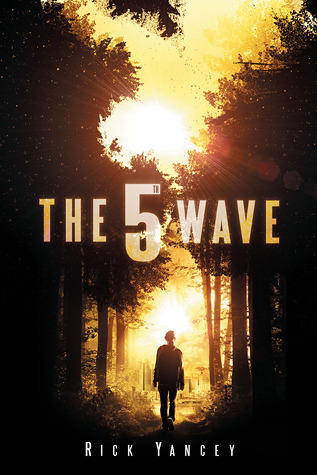 The 5th Wave
The 5th Wave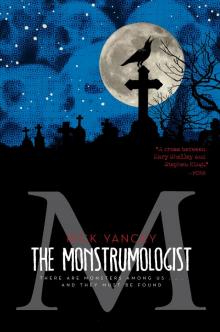 The Monstrumologist
The Monstrumologist The Infinite Sea
The Infinite Sea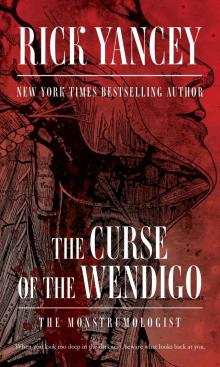 The Curse of the Wendigo
The Curse of the Wendigo The Isle of Blood
The Isle of Blood The Last Star
The Last Star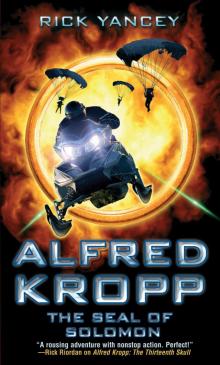 The Seal of Solomon
The Seal of Solomon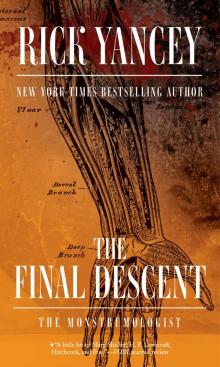 The Final Descent
The Final Descent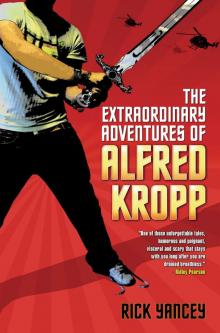 The Extraordinary Adventures of Alfred Kropp
The Extraordinary Adventures of Alfred Kropp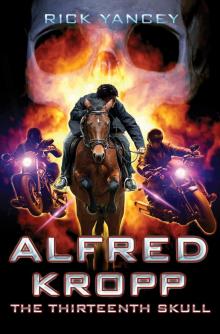 The Thirteenth Skull
The Thirteenth Skull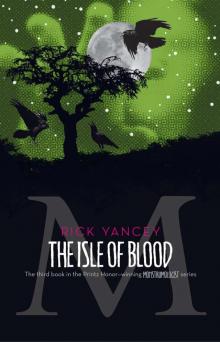 The Isle of Blood (Monstrumologist)
The Isle of Blood (Monstrumologist)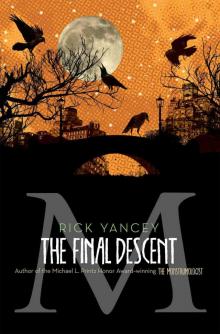 The Final Descent (The Monstrumologist)
The Final Descent (The Monstrumologist)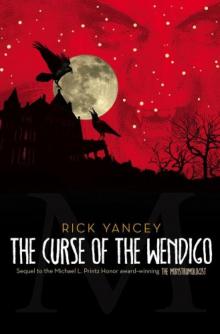 The Curse of the Wendigo (The Monstrumologist, Book 2)
The Curse of the Wendigo (The Monstrumologist, Book 2)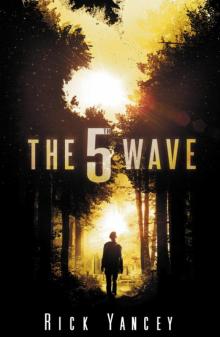 The 5th Wave t5w-1
The 5th Wave t5w-1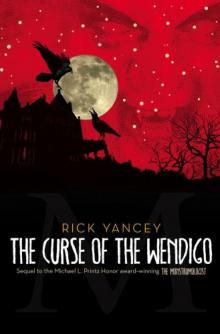 The Curse of the Wendigo (The Monstrumologist, Book 2) m-2
The Curse of the Wendigo (The Monstrumologist, Book 2) m-2